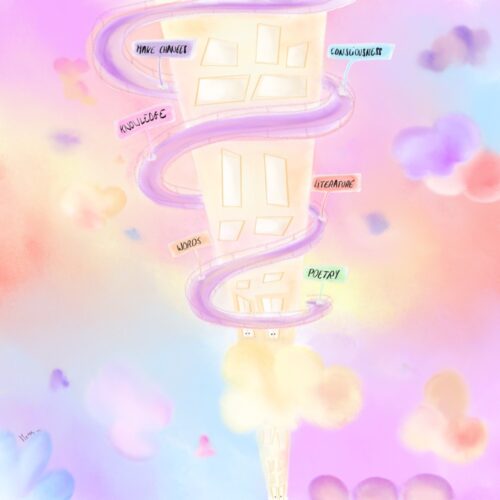Students Find Voice and Share It In Poetry for the People
By Sadie Peckens
speckens@mail.ccsf.edu
Can a single course change one’s life? According to alumni and teachers of Poetry for the People, IDST (Interdisciplinary Studies) 36, absolutely. Ike Pinkston, an underground rap artist for musical group Bored Stiff, a member of the Frisco Five hunger strikers, and an active alum of IDST 36 said, “This class will forever have a place in my heart. I will never forget this course. It had that much impact on my life, and who I am today.”
“Anybody going through a hardship should take this course. A lot of people turn to religion. I would say this is like a religion. It’s more deeply self-medicating,” Pinkston added. “And you don’t have to know all the ins and outs of poetry….That’s part of what it’s about, opening people’s eyes to a different avenue of expression.”
The course continues its legacy at City College this semester. It combines analysis of poems from multiple traditions across time with a focus on community and social justice. Leslie Simon, Interdisciplinary Studies Instructor and IDST 36 founder, began the course at City College in 1975 to create a public forum for poetry and to teach poetry as a voice for revolution.
“It goes back to a trip I made with my partner in Mexico in 1974,” Simon said. “I encountered the muralists. It was a very powerful impression. I came back to California via Chicago, my hometown, and there was a whole community mural project going on there. I thought, ‘I love that artists get to share their work…How can we do that with poetry?’”
Determined to make that happen, Simon wrote and sent a class proposal to 15 colleges. She was hired to teach the class in the City College Interdisciplinary Studies department in 1975. Since that time, the course has been taught by different people, and Simon believes, “there’s a lot of magic in that. No one should own Poetry for the People.”

Today, the course remains grounded in the roots of its founding. Each semester, the class brings poetry to the community. For example, Lauren Muller, CCSF Interdisciplinary Department Chair and IDST 36 instructor this semester, explained that during the summer IDST 36 students participated in a poetry exchange with students in the San Francisco County Jail. Also, there is a public reading at the end of each semester. Alumni return for end-of-semester readings because, “it’s almost like an extended family,” Pinkston said.
“One of the things I try to do in the class is establish a sense of community by encouraging students to share their own thoughts and feelings,” Muller said. “In doing so, we create ‘beloved community,’ a term that comes out of the civil rights movement. The term was invoked by Martin Luther King Jr. …it was the idea of people coming together across differences for a common movement.”
Even with the course being online due to COVID-19, Muller plans to make poetry interactive and public, through online community readings, open mics, and Zoom meetings with guest poets. Ladan (Ladi) Khoddam-Khorasani, an alum of the course who will be a teaching assistant this semester, said her “number one priority is to nurture the community online.”
Asked who should take the course, Tehmina Khan, English instructor and previous Poetry for the People instructor, responded, “I think everyone should take the course. Scientists, artists, people of all ethnic backgrounds.” Khan stressed that the course helps students find and develop their own writing voice. “This course teaches you to speak your truth,” Khoddam-Khorasani said.
Khan explained the importance of poetry, saying poems can be the, “consciousness of our time. The point of poetry is to inspire us, to move us, and to make us feel,” Khan stated, going on to say, “We are always reading nonfiction. We are always looking for facts. Poetry takes us to a different level of truth. Facts are just facts. Poetry gives us a sensibility.”
“I think we need poetry at all the campuses. As credit classes, as noncredit classes, as ways of building community,” Khan said, for when in-person instruction resumes.
City College’s offerings in the arts and noncredit courses have been reduced by recent class cuts.
“The more opportunity that people have to express themselves, to make meaning of the day to day life we are living in, the richer we are as a society,” said Khan about the importance of the arts.
Khoddam-Khorasani believes this course satisfies a universal need. “Poetry is so necessary at all times, but especially in times of crisis,” she said. “I return to poems every day. Poems will always be there for us. I think this class is more essential than ever. I think poets and artists are absolutely essential. My wish is that every student at City College would take this class.”
